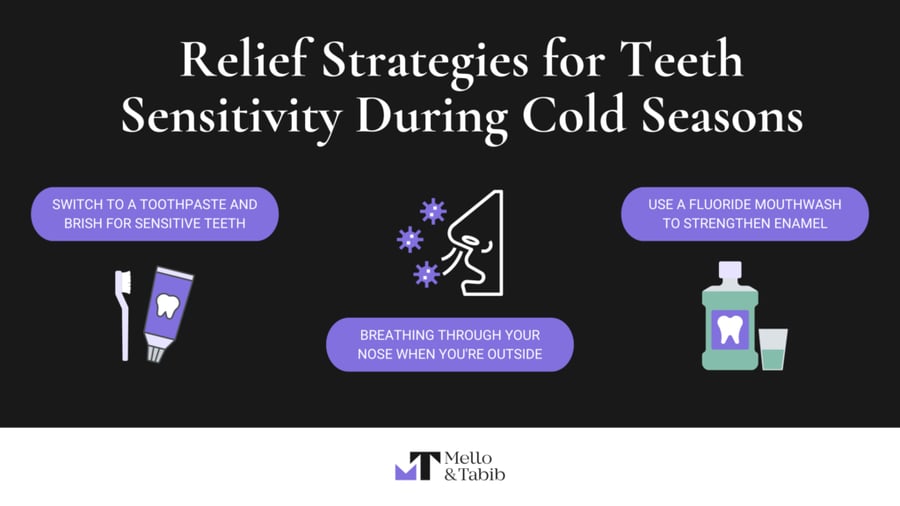Can Cold Weather Make My Teeth Hurt?
December 8th, 2023 | 4 min read

As winter approaches and temperatures drop, you might find yourself asking, “Can cold weather make my teeth hurt?” If you’ve ever experienced a sharp pain in your teeth while breathing in cold air, you’re not alone. This phenomenon is more common than you might think, and it’s not just a figment of your imagination.
In fact, at NYC Smile Design, we frequently meet patients who describe a sudden onset of tooth sensitivity as the mercury dips, making this a timely topic for many.
In this comprehensive guide, we’ll explore the factors that contribute to tooth sensitivity in cold weather, offer strategies for relief, and encourage you to seek dental care when needed. We believe that knowledge is the first step toward a pain-free winter season.
Why Do Teeth Become Sensitive in Cold Weather?
When the temperature drops, you might notice that your teeth start to feel a bit more sensitive than usual. This isn’t just a coincidence; there’s some science behind it. You see, each of your teeth is made up of several layers. The outermost layer is called enamel, which is super hard and acts as a protective shield for your teeth. Underneath the enamel is another layer called dentin, which is not as tough and is directly connected to the nerves inside your teeth.
Now, here’s where the cold weather comes into play. When you’re out in the cold, the enamel on your teeth can contract or shrink a little bit. This might expose some of the dentin underneath. Because dentin is connected to the nerves, when it gets exposed to cold air, you might feel a sharp pain or sensitivity. It’s like your teeth are sending you a little signal saying, “Hey, it’s cold out here!”
So, if you’ve ever wondered why biting into an ice cream cone or breathing in cold air makes your teeth hurt, now you know. It’s all about how the different layers of your teeth react to changes in temperature. And if your teeth are already a bit sensitive, the cold can make them feel even more uncomfortable. That’s why it’s super important to take good care of your teeth, especially when the weather gets chilly.

The Role of Enamel and Dentin
Let’s dive a little deeper into what enamel and dentin are, and why they’re so important for your teeth, especially when it comes to sensitivity in cold weather. Think of enamel like the superhero cape for your teeth. It’s the hardest substance in your body and acts like a protective shield. It’s the first line of defense against everything you eat, drink, and even the air you breathe. When it’s cold outside, your enamel is what stands between the chilly air and the sensitive inner parts of your teeth.

Now, let’s talk about dentin. If enamel is the superhero cape, then dentin is like the regular clothes the superhero wears underneath. It’s not as strong as enamel, but it’s still pretty important. Dentin is full of tiny little tunnels, called tubules, that lead straight to the nerves inside your teeth. Imagine these tubules like tiny highways for sensations to travel to the nerve center of each tooth.
So, what happens when the enamel gets worn down or damaged? Well, that superhero cape gets a tear, and suddenly, the dentin is exposed. When this happens, all those tiny tubules in the dentin become like open roads leading straight to your nerves. So, when you breathe in cold air or sip a cold drink, that sensation goes right down those tubules and hits the nerves, causing that zing of sensitivity or pain you might feel.
Understanding the roles of enamel and dentin can help you better grasp why your teeth might be extra sensitive in cold weather. It’s all about the protection that enamel provides and what happens when that protection is compromised, leaving dentin exposed.
Common Causes of Tooth Sensitivity
Tooth sensitivity isn’t just a random occurrence; there are specific reasons why you might be feeling that sharp twinge or dull ache. Let’s break down some of the most common culprits that could be making your teeth sensitive, especially when it’s cold outside.
Tooth Decay
First up is tooth decay. This is basically when harmful bacteria in your mouth start to eat away at your teeth. It’s like a villain in a movie, slowly chipping away at the hero’s armor. When this happens, the protective enamel on your teeth starts to break down, leaving the sensitive dentin exposed.
Gum Disease
Next, we have gum disease, also known as periodontal disease. This is when the gums around your teeth get inflamed or infected. Imagine your gums as the soil in a garden; if the soil isn’t healthy, the plants (your teeth, in this case) can’t thrive. Gum disease can cause your gums to recede, exposing the roots of your teeth, which are not protected by enamel and are therefore more sensitive.
Foods to Avoid
Your diet can also play a big role. Foods and drinks that are high in acid, like citrus fruits or soda, can erode your enamel over time. It’s like the results of a chemical peel on your skin, slowly wearing it away. The more your enamel chips away, the more sensitive your teeth can become.
But it’s not just what you consume that can cause sensitivity; it’s also how you take care of your teeth. Brushing too hard or using a toothbrush with bristles that are too stiff can wear down your enamel. It’s like scrubbing a non-stick pan with steel wool; you’ll eventually scrape off the non-stick coating.
Teeth Grinding
Lastly, teeth grinding, also known as bruxism, can contribute to tooth sensitivity. When you grind your teeth, usually while sleeping, you’re putting a lot of pressure on them. This can wear down the enamel and even cause tiny cracks in your teeth, making them more susceptible to sensitivity.
Strategies for Relief
If you’re grappling with tooth sensitivity in cold weather, you’re not alone, and there are ways to find relief. One simple yet effective approach is to switch to a toothpaste designed for sensitive teeth like Sensodyne. These specialized toothpaste contain ingredients that block the tiny tubules in the dentin layer, reducing the direct pathway to the nerves and making your teeth less sensitive to cold air or foods.
Breathing through your nose when you’re outside can also help. Your nose acts like a natural air filter and is warmer, minimizing the cold air’s impact on your teeth. Another option is to use a fluoride mouthwash, which can strengthen enamel and reduce sensitivity. If you’re still using a hard-bristled toothbrush, consider switching to a soft-bristled one. It’s gentler on your teeth and gums, helping to preserve the enamel layer.

If your sensitivity persists or worsens, consulting a dental professional is advisable. They can offer treatments like fluoride varnishes or dental bonding to protect exposed dentin and reduce sensitivity. Overall, these methods can contribute to a more comfortable winter season, free from the distraction of sensitive teeth.
When to See a Dentist
If you’ve tried various home remedies and still experience discomfort, it may be time to consult a dental professional. A dentist can provide more advanced treatments, such as applying a fluoride gel to strengthen your enamel or even recommending a crown or bonding procedure to protect your teeth.
Tooth sensitivity in cold weather is a common issue that many people face. Understanding the underlying factors and taking appropriate measures can go a long way in providing relief. If you’re struggling with this issue, don’t hesitate to seek professional advice. For more information on dental care, you can visit NYC Smile Design’s website.
Topics:

